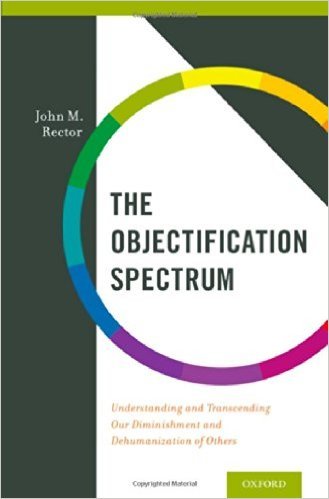John Rector’s The Objectification Spectrum
By Daniel Liechty | May 15, 2020
Of recent interest is the new book by John M. Rector, The Objectification Spectrum: Understanding and Transcending Our Diminishment and Dehumanization of Others (Oxford University Press 2014). In this high quality book, Rector offers a sensitive and creative exploration of objectification theory. Objectification theory in psychology and philosophy includes a lot of territory, some of which is quite esoteric, but all of it in one way or another attempts to address our tendencies to view and treat self and others as objects. Building especially on the work of Martha Nussbaum and others, Rector’s examination digs deeper than previous studies by looking at objectification within the context of recent work in emotions, cognition and neuroscience. This is quite welcome, because often academic treatments of philosophical and psychological issues become completely bogged down in parsing sentences or the minutiae of research methodology. By keeping his discussion rooted in clinical and empirical studies, Rector admirably avoids this mire. His book will be of interest to a wide audience, and certainly to any reader of the EBF Newsletter.
Clinicians will be especially interested in Rector’s demonstration that many of the common emotional disorders can be traced to misperceptions of the symbolic Self and its place in the social environment. This parallels much of Ernest Becker’s own recasting of emotional disorders as relational problems in his early book,Revolution in Psychiatry (1964), and again as reactions to death anxiety (that is, self-in-relation-to-death) inDenial of Death (1973). Rector is very generous in references to Becker’s later work. Unfortunately, because he has read Becker more or less exclusively through the eyes of Terror Management Theory, he highlights Becker’s social psychology (cultural worldview defense) only and misses the many significant connections that could be made with Becker’s work in wider areas of individual psychology, education, and spirituality.
Rector’s investigations into objectification were originally motivated by his own desire to better understand human evil. As he went increasingly deeper into the “dark side” of human nature, a vista of interconnected ideas and issues opened up to him, and in this book he has retained the sense of passion for the investigation, retracing his steps as the basic layout of the book. As a result, Rector’s investigation of the human psyche reads at times almost like a detective novel. He is on the trail of something important, and keeps shaking the tree of evidence until it yields its fruits!
Most importantly, Rector is not satisfied simply to better understand objectification and the undeniable human evil that flows from it. He moves the investigation toward an exploration of methods by which people have learned to overcome our tendencies to objectify others. Many of these bring us directly into the arena of what might broadly be called human spirituality. Rector wisely does not simply equate spirituality with religion, however, and lays out honestly both theistic and nontheistic approaches for transcending our tendencies toward objectification of self and others.
Without doubt, Rector presents here a profoundly humane text of fundamental importance to helping professionals, as well as those who teach and train in the helping professions. In this regard, as one who does teach and train young social workers, I need to mention one disappointment. My students (who I assume are at least somewhat typical) regularly confuse Objectification Theory with Object Relations Theory. On one level, this could be written off to the superficial similarity of the terms. However, one a slightly deeper level, it can also be seen that objectification, in its broadest sense as a tendency of the psyche to see itself as “acting upon and being acted upon” is at the center of the Object Relations perspective, as outlined by D.W. Winnicott and the British school of psychoanalysis. In that perspective, some level of objectification is unavoidably necessary not just to “think objectively,” but indeed to think at all. It may well be that in some niches of the many departments of psychology and counseling in America, ORT is considered nearly as passé as psychoanalysis itself. But I would point out that at least in schools of social work (who train more than 50% of America’s talk therapists, after all…) this is definitely not the case. Although ORT is not exactly cutting edge anymore, it is considered to be one of the pool of older “tried and true” approaches that provide a background against which more recent theories are judged. Therefore, I would have liked to see some discussion of ORT in this book, at the least a clear contrast between the way in which “object” is used in both theories, and more generously the many ways in which an ORT approach could benefit from the discussion of transcending objectification in the clinical setting. Again, Ernest Becker’s work understood more usefully in the round could provide just the bridge required for that connection.

